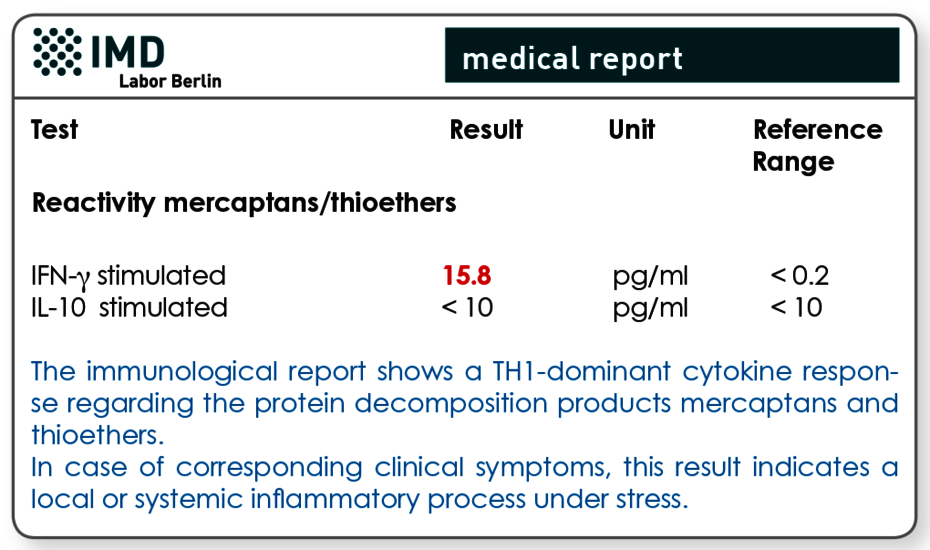Sensitisations against mercaptans and thioethers
Next to their toxic effect, pulpless teeth and corresponding intermediary products, such as mercaptans and thioethers, may function as focal points of immunological inflammatory responses.
Despite perfect methods regarding the preparation of root canals, complete removal of organic tissue and microorganisms is impossible. Hence, due to the remaining anaerobic bacteria, such as Porphyromonas gingivalis, Prevotella intermedia, Fusobacterium nucleatum, or Treponema denticola, hydrogen sulphide compounds, like methyl mercaptans, and thioether compounds, e.g. dimethyl sulphide and diethyl sulphide, inevitably develop. The toxicity of these products has been known for over 30 years. However, their toxic effects usually do not suffice to explain local and systemic inflammatory responses and patients’ individual symptoms.
Studies have proven that decomposition products of proteins can, leaving their toxic effects aside, cause inflammatory responses as well. Those are not dose-dependent (regarding the amount of toxins). Here, individual sensitivity is decisive
Typing of effector cells regarding mercaptans and thioethers detects corresponding immune responses
The typing of effector cells regarding mercaptans and thioethers indicates whether there is a currently ongoing immune response with regard to these substances, by using the detected cytokine pattern (TH1-IFN-γ/Treg-IL-10). Positive test results point out both an existing sensitisation, and a very likely acute or persisting burden with mercaptan and thioether compounds.
In a recently published study (Jacobi-Gresser 2014), the test’s specificity was corroborated and additionally, it was demonstrated that measures, such as the revising of root canal fillings or tooth extractions, have a significant impact on laboratory test results. After successful treatment, measured values decreased in more than 90 % of patients.
Fig. 1 sample medical report
Material
10 ml heparin blood
Sample receipt within 24 hrs has to be ensured. Blood samples should be stored and transported at room temperature. Within the Berlin city area, we offer a courier service (+49 (0)30 7701-250). For collections beyond Berlin, please contact our free of charge courier service (+49 (0)30 77001-450).
Costs
Please obtain the costs for the analysis from the pdf-document.
Would you like to see a presentation on the matter?
In our video archive, you can find a free presentation on this topic. Access is free und possible without prior registration.
Literature
- Jacobi-Gresser et al. Methyl mercaptan and hydrogen sulfide products stimulate proinflammatory cytokines in patients with necrotic pulp tissue and endodontically treated teeth. Journal of biological regulators and homeostatic agents. Submitted Sept. 2014
- Lin LM, Pascon EA, Skribner J, Gängler P, Langeland K. Clinical, radiographic, and histologic study of endodontic treatment failures. Oral Surg Oral Med Oral Pathol. 1991;71:603-611.
- Ng YL, Tonzetich J. Effect of hydrogen sulfide and methyl mercaptan on the permeability of oral mucosa. J Dent Res. 1984 ;63:994-997.
- Persson S, Edlund MB, Claesson R, Carlsson J. The formation of hydrogen sulfide and methyl mercaptan by oral bacteria. Oral Microbiol Immunol. 1990;5:195-201.
- Ratkay LG, Waterfield JD, Tonzetich J. Stimulation of enzyme and cytokine production by methyl mercaptan in human gingival fibroblast and monocyte cell cultures. Arch Oral Biol. 1995;40:337-344.

